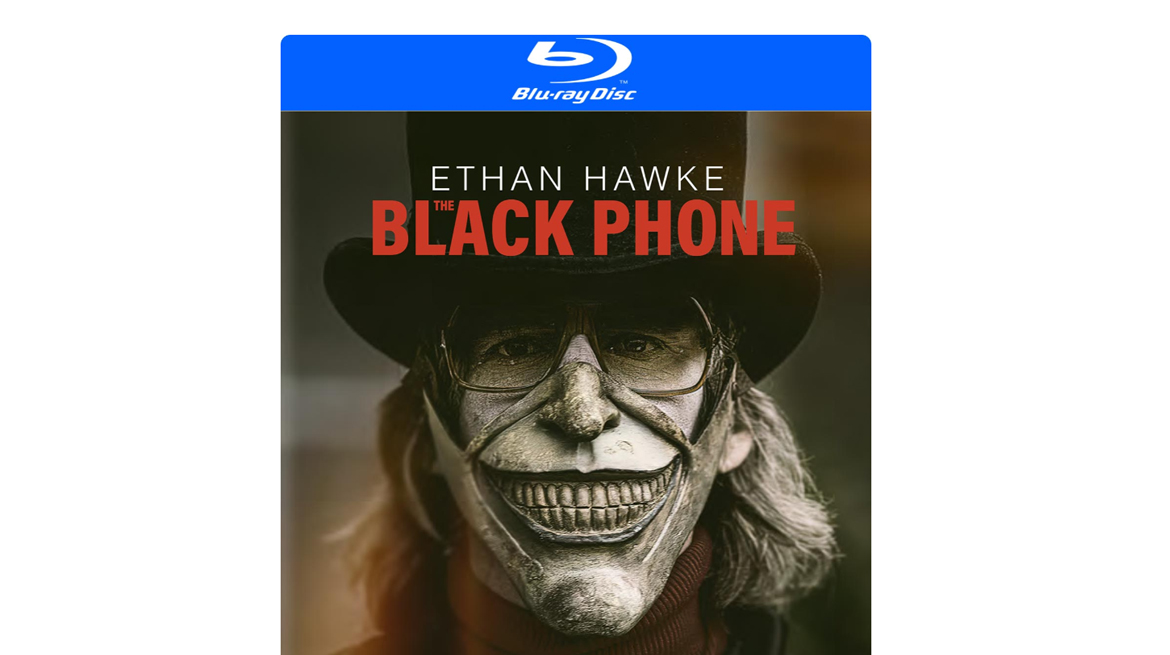TL;DR
Ethan Hawke's chilling portrayal of a child abductor and a solid performance from newcomer Mason Thames are highlights of "The Black Phone." However, despite its star power and directorial pedigree, the film falters due to a less-than-credible plot and narrative leaps, particularly concerning a supernatural ringing phone. While visually polished on Blu-ray with an excellent soundtrack, the complete lack of bonus features leaves this horror flick feeling disappointingly incomplete. Dive into the full review to see if this unsettling tale is worth your time.
In 1970s suburban Denver, teenager Finney (Mason Thames) lives with his sister Gwen (Madeleine McGraw) and their alcoholic father Terrence (Jeremy Davis). Finney struggles with bullies and social interactions. A murderer and pedophile, known as The Grabber (Ethan Hawke), is preying on the local children. One day, Finney becomes his next victim, finding himself trapped in a soundproofed basement containing only a bed, some discarded items, and an old, black telephone mounted on the wall. After The Grabber leaves him alone, the unplugged phone inexplicably begins to ring…
Horror and comedy are arguably the most challenging film genres for directors and screenwriters. The subjective nature of fear and humor makes it difficult to resonate with a broad audience. The Black Phone, the subject of this review, has been lauded as exceptionally frightening. However, similar to my experience with The Nun, I personally did not find it particularly scary.
Despite boasting strong performances from its cast, including newcomers Mason Thames and Madeleine McGraw, and an unsettling portrayal of the killer by Ethan Hawke, whose masks amplify the eerie atmosphere, The Black Phone ultimately falls short. Director Scott Derrickson (Dr Strange), a seasoned horror filmmaker, brings his expertise to the project. However, the fundamental weakness lies in the narrative itself.
The Black Phone is based on a short story by Joe Hill. For those unfamiliar with the name, a quick image search will reveal his striking resemblance to his father, Stephen King. Having not read the source material, I cannot pinpoint whether the shortcomings originated in Hill’s story or in the screenplay adaptation by Derrickson and Robert Cargill.
Several structural issues prevent the story from generating genuine mystery or fear. A murderer is at large, identifiable by his black van and the black balloons left at abduction sites. Finney witnesses someone struggling with an individual near a black van and approaches to offer help, leading to his capture. It’s difficult to empathize with a character displaying such a lack of awareness. Furthermore, The Grabber’s conspicuous use of a black van adorned with black balloons, while the police are actively searching for someone matching that description, strains credibility. The narrative’s logic further unravels when the van is parked at the murderer’s residence, yet remains unnoticed.
The titular telephone in the basement appears incongruous. Its presence on a bare wall lacks any logical explanation. The subsequent ringing of the unplugged phone, revealing communication with The Grabber’s previous victims, is accepted by Finney with surprising ease.
The narrative could have benefited from a more nuanced approach. The Grabber’s explicit statement that the phone is disconnected eliminates any potential ambiguity. The ringing phone immediately signals a supernatural element. A more effective approach would have been to omit a number dial, leading Finney to initially believe that calls could only be received, not initiated. The revelation that the phone is entirely disconnected would then carry significantly more weight.
The story’s inspiration from Stephen King‘s works is evident, with thematic echoes of The Shining and It present in The Black Phone.
While The Black Phone is not available on Ultra HD in Sweden, import versions can be purchased from England, the USA, or Germany. The Swedish Blu-ray release is technically sound, featuring a 1080p image with a high bit rate, resulting in a stable, flicker-free picture. Black levels are deep, and the color palette, while somewhat muted to reflect the 1970s setting, is clear and well-defined. The 7.1 DTS soundtrack provides an immersive soundscape with robust bass and crisp dialogue. The surround speakers are effectively utilized during suspenseful sequences.
Similar to my disappointment with the lack of bonus content on the Jurassic World: Dominion release, The Black Phone suffers from the same omission. The absence of extra material on a full-priced release is a significant drawback. Consumers who purchase physical media often have a deep interest in the film and appreciate supplementary content. The inclusion of EXTRAS is a fundamental expectation.
While the absence of extra features might be understandable if none existed, import releases include documentaries and other supplemental material. This is a regrettable omission for an otherwise commendable release.
In conclusion, The Black Phone did not fully meet my expectations. The film’s occasionally simplistic approach diminished my engagement. The Blu-ray release’s lack of bonus features further detracts from its overall value.
SF Studios provided a review copy of this release. Providers of review materials do not influence editorial content.
